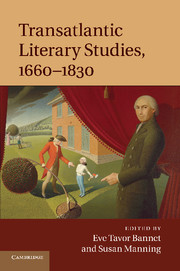Book contents
- Frontmatter
- Contents
- Notes on contributors
- Acknowledgements
- Introduction: British and American genres
- Chapter 1 Transatlantic books and literary culture
- Chapter 2 Transatlantic utopianism and the writing of America
- Chapter 3 Tales of wonder, spiritual autobiographies, and providence tales
- Chapter 4 Life writings
- Chapter 5 Benjamin Franklin and transatlantic literary journalism
- Chapter 6 Theatre, drama, performance
- Chapter 7 Transatlantic American Indians
- Chapter 8 Literature of the ocean
- Chapter 9 “To gird this watery globe”
- Chapter 10 Ghostly and vernacular presences in the black Atlantic
- Chapter 11 Susanna Rowson and the transatlantic captivity narrative
- Chapter 12 Domestic fiction and the reprint trade
- Chapter 13 Transatlantic Gothic
- Chapter 14 Transatlantic Romanticisms
- Chapter 15 Journeys of the imagination in Wheatley and Coleridge
- Chapter 16 Transatlantic historical fiction
- Further reading
- Index
- References
Chapter 14 - Transatlantic Romanticisms
Published online by Cambridge University Press: 05 January 2012
- Frontmatter
- Contents
- Notes on contributors
- Acknowledgements
- Introduction: British and American genres
- Chapter 1 Transatlantic books and literary culture
- Chapter 2 Transatlantic utopianism and the writing of America
- Chapter 3 Tales of wonder, spiritual autobiographies, and providence tales
- Chapter 4 Life writings
- Chapter 5 Benjamin Franklin and transatlantic literary journalism
- Chapter 6 Theatre, drama, performance
- Chapter 7 Transatlantic American Indians
- Chapter 8 Literature of the ocean
- Chapter 9 “To gird this watery globe”
- Chapter 10 Ghostly and vernacular presences in the black Atlantic
- Chapter 11 Susanna Rowson and the transatlantic captivity narrative
- Chapter 12 Domestic fiction and the reprint trade
- Chapter 13 Transatlantic Gothic
- Chapter 14 Transatlantic Romanticisms
- Chapter 15 Journeys of the imagination in Wheatley and Coleridge
- Chapter 16 Transatlantic historical fiction
- Further reading
- Index
- References
Summary
In Life on the Mississippi (1883), Mark Twain holds Sir Walter Scott accountable for the major cultural and political developments in the nineteenth-century United States. Complaining about the “Sir Walter disease” that ailed the country, he argues with a mix of acerbity and levity:
Sir Walter had so large a hand in making Southern character, as it existed before the war, that he is in great measure responsible for the war…If one take up a Northern or Southern literary periodical of forty or fifty years ago, he will find it filled with wordy, windy, flowery “eloquence,” romanticism, sentimentality.
I want to take Twain's comment as an opportunity to interrogate the different approaches we might take in engaging critically with transatlantic Romanticism. Parsing the claims and assumptions of Twain's argument, we arrive at the following questions about transatlantic Romanticism: (1) What is the impact of English authors and texts in America, and vice versa? (2) Does Romanticism foster a shared transatlantic culture, or generate national and regional specificity?
These questions become further complicated by the fact that Twain is discussing the Civil War and gendering “Southern character,” for “it was Sir Walter that made every gentleman in the South a major or a colonel, or a general or a judge.” This masculine gendering relied on specific “structures of feeling,” to borrow Raymond Williams's phrase, that made “flowery ‘eloquence’” key to nineteenth-century literature. Twain's assessment thus occasions three additional questions: (3) What are the gender politics of transatlantic Romanticism? (4) What is the importance of slavery and race, which Twain elides in his discussion of the Civil War, for our understanding of transatlantic Romanticism? (5) How does this expand our understanding of transatlantic Romanticism beyond Anglo-American Romanticism?
- Type
- Chapter
- Information
- Transatlantic Literary Studies, 1660–1830 , pp. 219 - 237Publisher: Cambridge University PressPrint publication year: 2011
References
- 1
- Cited by



